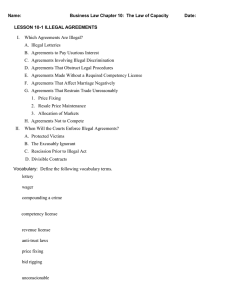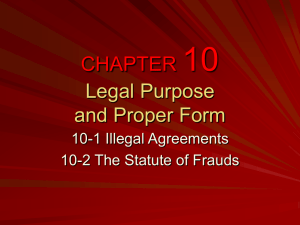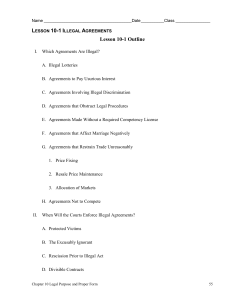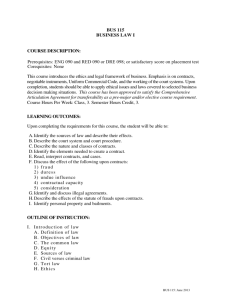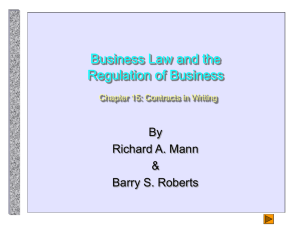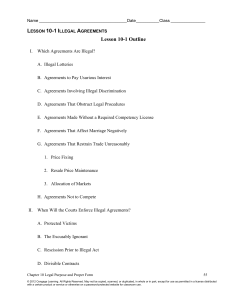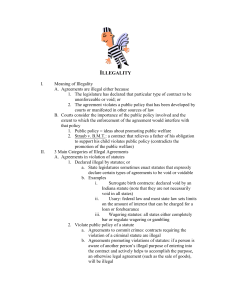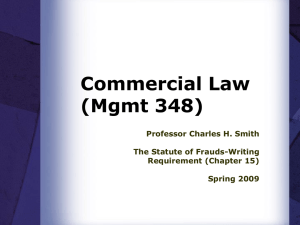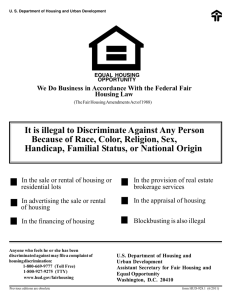CHAPTER 10 Legal Purpose and Proper Form
advertisement
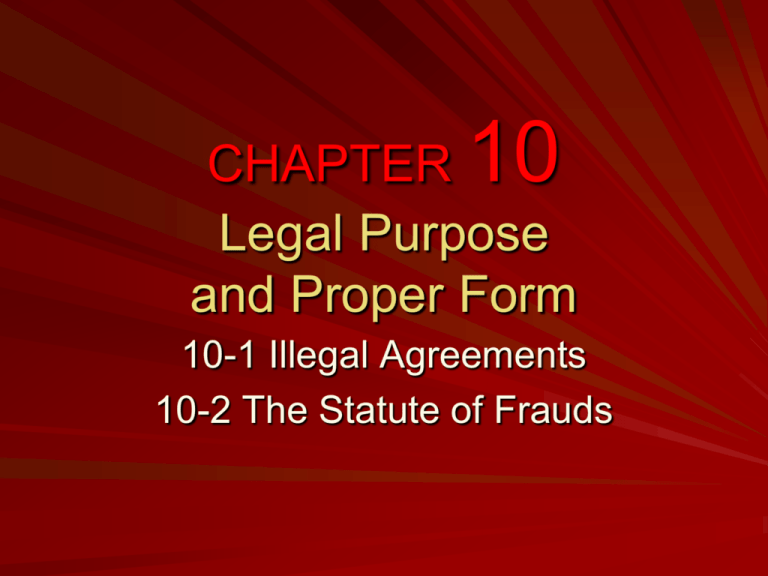
10 CHAPTER Legal Purpose and Proper Form 10-1 Illegal Agreements 10-2 The Statute of Frauds 10-1 Illegal Agreements GOALS Identify various forms of illegal agreements Distinguish agreements that, although illegal, the courts will enforce WHICH AGREEMENTS ARE ILLEGAL? 1. Illegal lotteries – Most states forbid or regulate gambling with statutes. – To be a lottery you have A prize A chance (winner determined by luck) Consideration (payment to participate) – A Wager – most common form of gambling. bet on the uncertain outcome of an event. – Legalized gambling could be: Casinos Pari-mutuel betting – betting in which the winner share the total prize pool State-run lotteries Bingo games and pull-tab betting WHICH AGREEMENTS ARE ILLEGAL? 2. Agreements to pay usurious interest – lending money at a rate higher than the state maximum allowable rate. – If no rate is stated you pay the legal rate of interest which is specified by state statute. (7 to 12%) – Higher rates are allowed for loan companies and pawnbrokers. 3. Agreements involving illegal discrimination 4. Agreements that obstruct legal procedures – Includes to pay non-expert witnesses in a trial to testify, or pay for false testimony, bribe jurors, refrain from informing on or prosecuting an alleged crime in exchange for money or other consideration. (Called Compounding a crime) WHICH AGREEMENTS ARE ILLEGAL? 5. Agreements made without a required competency license – – Competency license - Persons who lack the required competency license may not enforce the contracts they make in doing the regulated work. Doctors, Lawyers, Teachers, Pharmacists. Also real estate brokers, insurance agents, and building contracts are subject 6. Agreements that affect marriage negatively (paying NOT to marry) WHICH AGREEMENTS ARE ILLEGAL? 7. Agreements that restrain trade unreasonably – US economic system based on free and open competition. – Price fixing – Federal Crime. Agreements to fix prices are unenforceable. (you charge $5 for gas, I will too!) bid rigging – occurs when competitors who bid on jobs agree that one will have the lowest bid for a particular job. They take turns being lowest bidder. – Resale price maintenance – illegal to for manufacturers to agree with retailers to sell the product at a particular price. (Can have a suggested retail price.) Agreements not to compete? – Allocation of markets – i.e. Ford won’t sell outside the U.S. – Agreements not to compete – price fix/allocation of markets are examples. However, this can be LEGAL if YOU are hired by a firm, and agree NOT TO COMPETE if you quit for a reasonable time (i.e. hair dresser, specific business type in same city, etc.) WHEN WILL THE COURTS ENFORCE ILLEGAL AGREEMENTS? 1. Protected victims – If contact violates a law designed to protect a party to the agreement. The victim may obtain restitution. – If agreement was created by fraud, duress, misrepresentation, or undue influence, the victim may obtain restitution. 2. The excusably ignorant – can either enforce the legal part of the contract or obtain restitution. This person who: Does not know the contract is illegal but, The other party knows the transaction is illegal and the illegality is minor. WHEN WILL THE COURTS ENFORCE ILLEGAL AGREEMENTS? 3. Rescission prior to illegal act – if a party rescinds before the illegal act occurs, then restitution will be available. (you pay someone $50 to steal final exam, but call it off before, could get money back). 4. Divisible contracts – Contracts can contain a combination of legal and illegal provisions. Courts may enforce the legal part of a contract if it is divisible. What is Unconscionability?? Unconscionability -- Occurs when there is a grossly unfair contract that parties under ordinary circumstances would not accept. – Procedural Unconscionability – shown by how the contract is created. Arises when contracts contain very fine print, light typesetting, elements of fraud, duress. – Substantive unconscionability – arises from unfair terms in the agreement. Can be a price so high that it shocks, very one-sided terms. – Most courts want both procedural and substantive involved – Courts can refuse to enforce, enforce parts or modify the terms of an agreement ruled unconscionable. Unconscionable Group Activity!! Divide into groups Problem: Welfare recipient, with 4th gr. Education agrees to purchase a refrigerator for $2,300. Two-year loan contract with high, but legal interest rate. Same fridge usually sells for $500. Is this unconscionable?? Why/Why Not?? Complete 10-1 Cases! In your groups, read and talk about cases on handout Be ready to discuss! 10-2 The Statute of Frauds GOALS Explain why the Statute of Frauds is necessary and what it requires Identify the main instances when the Statute of Frauds requires a writing Understand the rules of contract interpretation FOCUS Must all contracts be in writing?? WHY HAVE A STATUTE OF FRAUDS? Contracts within the Statute of Frauds – those the states require be placed in writing to be enforceable in court. Contracts for Marriage Contracts that are more than a Year Contracts for sale of Land Executor who promises to pay the debts of another Sale of Goods $500 or more What a Contract is NOT in Writing?? If contracts that fall under Statue of Frauds are not in writing then: Executed contracts – contract that has been fully performed. Courts leave the parties where they are. Neither party can reverse the contracts. ( You receive the pizza and pay for it) Executory contracts – contract not fully performed. Courts will not take action on either party to enforce the contract. May be able to get back any consideration by suing based on quasi-contract. (exists when some element of an enforceable contract is missing.) Courts award $ to prevent the unjust enrichment of one party. (You call and order a pizza to be delivered.) Requirements of the Writing Requirements vary for state to state (Alaska here!). – Some states only need to indicate there is a contract. Most stringent ones must contain essential terms: Name of parties Subject matter description Price Quantity Signature Other essential terms (depends on nature of transaction) Can include method of delivery, if real estate description of realty. Requirements of the Writing (cont.) – UCC requirements – almost the same in every state. Writing must indicate only: Quantity of goods That the contract has been created between parties. – Special rules for signatures – under statue of frauds only the names signed on the contract can be sued for enforcement. Signature may be written, stamped, engraved, printed or a mark intended to be a signature. Under UCC signed by one party and sent to the other party is enforceable against the other party unless the other party objects to the terms of the contract within 10 days. Name the six essential elements in a writing required by the most demanding Statutes of Frauds standards. Names of the parties, subject matter description, price, quantity, signature, other essential terms. TYPES OF CONTRACTS WITHIN THE STATUTE OF FRAUDS Executory contracts that must be in writing and signed by the party against whom the contract is to be enforced. – Contract for the sale of goods for $500 or more (bill of sale) UCC exceptions: – – – – Goods ordered to be specially manufactured When goods ordered and paid for When goods have been received and accepted by buyer When party against whom enforcement is sought admits that oral contract was made. Contract to sell an interest in real property – Exceptions that will enforce oral contract if seller gave contract to buyer and buyer has Made payment Occupied the land Made substantial improvements to land Contracts that require more than one year to complete – Begins when contract made TYPES OF CONTRACTS WITHIN THE STATUTE OF FRAUDS Contract to pay a debt or answer for another’s debt – Collateral promise: promise of payment of debts for another. – Primary promise: promise of payment for self. Does not have to be in writing – Exception—main purpose rule (promise serves the promisor’s own interest) “I promise to pay your rent if you can’t.” Contract for which the consideration is marriage – needs to be in writing when one promises to marry in return for something other than the other’s promise to marry. Name the five types of executory contracts that require a writing. Contracts for the sale of goods valued at $500 or more, contracts to sell real property, contracts that cannot be completed within one year, contracts to pay debts of another, contracts when consideration in marriage. HOW ARE CONTRACTS INTERPRETED? Integration clause – both parties agree that the terms in the written contract and the contract is complete and final. Specific rules of interpretation – Analysis – main purpose of the contract – Conflicting terms Handwritten term prevail over typewritten terms Amounts written in words prevail over amounts written in figures Typewritten and handwritten terms prevail over printed terms. – Words - using plan and normal definitions – Authors of ambiguity – if ambiguous goes against the writer. Contract of adhesion – contracts prepared by the stronger parties – Implied reasonableness – when no time stated for performance a reasonable time is allowed. HOW ARE CONTRACTS INTERPRETED? Parol evidence rule - words spoken prior to the execution of the final writing or at the time of signing are not allowed to be considered in court. – EXCEPTIONS!! To clarify ambiguities in the written agreement If written contract was not intended to be a complete agreement If a condition necessary to the existence of the contract never occurred. If fraud, forgery, illegality, mistake, or misrepresentation occurred. To show the parties reached another agreement or terminated the contract under consideration after executing the written contract. To show that the contract is voidable because a party laced contractual capacity. Explain the parol evidence rule. The parol evidence rule requires that the final written version of the contract be the sole source of evidence about its terms. Therefore, no oral evidence to contradict the terms of the writing can be introduced unless it falls into one of the categories of exceptions. STATUTE OF FRAUDS SONG!! Complete 10-2 Cases! In your groups, read and talk about cases on handout Be ready to discuss!
